1994 年 1 月英语四级真题及答案
Part I Listening Comprehension (20 minutes)
Section A
1.
A) Once a week.
B) Twice a week.
C) Three times a week.
D) Four times a week.
2.
A) He left his notes at home.
B) He doesn’t know where his notes are.
C) He doesn’t want to lend his notes to the woman.
D) He agrees to lend her his notes.
3.
A) He will go in spite of the cold weather.
B) He won’t go since he is not feeling well.
C) He will go when he feels better.
D) He won’t go as he hasn’t finished his work.
4.
A) Check the timetable.
B) Go to the railway station earlier.
C) Travel on a later train.
D) Cancel the trip earlier.
5.
A) In New York.
B) In Boston.
C) In Newport.
D) In Washington.
6.
A) A clerk at the airport information desk.
B) A clerk at the railway station information desk.
C) A policeman.
D) A taxi-driver.
7.
A) A guest and a receptionist.
B) A passenger and an air hostess.
�
C) A customer and a shop assistant.
D) A guest and a waitress.
8.
A) He’s better.
B) He’s feeling worse.
C) He’s sick in bed.
D) He has recovered.
9.
A) The man didn’t want the woman to have her hair cut.
B) The woman followed the man’s advice.
C) The woman is wearing long hair now.
D) The man didn’t care if the woman had her hair cut or not.
10. A) He will return from Paris in two weeks.
B) He is studying French in Paris.
C) He is having a vacation in Paris.
D) He is planning to go back to Paris in a year.
Section B
Questions 11 to 14 are based on the passage you have just heard.
Passage One
11. A) Washing plates.
B) Clearing tables.
C) Shining shoes.
D) Sweeping the floor.
12. A) He must work six days a week.
B) He should never be late for work.
C) He must study hard in his spare time.
D) He should not bring his friends to the restaurant.
13. A) To pay him for his work.
B) To let him have 3 meals a day in the restaurant.
C) To give his friends free drinks.
D) To allow him to have more free time.
14. A) Because the boy was not a full-time worker.
�
B) Because the boy had made some mistakes.
C) Because he thought the boy had failed to meet his requirements.
D) Because he thought it was his son who should pay him.
Questions 15 to 17 are based on the passage you have just heard.
Passage Two
15. A) Watching traditional plays.
B) Visiting the magnificent libraries.
C) Boating on the river.
D) Cycling in narrow streets.
16. A) There are many visitors there.
B) There are many students there.
C) There are many old streets there.
D) There are many bicycles there.
17. A) He thinks the city is too crowded.
B) He likes the place very much.
C) He thinks the streets are too narrow.
D) He admires the comfortable life of the students there.
Questions 18 to 20 are based on the passage you have just heard.
Passage Three
18. A) He was good at writing about interesting people.
B) It was much easier to write stories about people.
C) He believed that people are always easier to learn about other people.
D) He thought people played an important role in world events.
19. A) Action.
B) World News.
C) Enterprise.
D) Faces and places.
20. A) He is a sportsman.
B) He is an actor.
C) He is a photographer.
�
D) He is a publisher.
Part II Reading Comprehension (35 minutes)
Passage One
Questions 21 to 25 are based on the following passage.
Suppose we built a robot(机器人) to explore the planet Mars. We provide the robot
with seeing detectors to keep it away from danger. It is powered entirely by the sun.
Should we program the robot to be equally active at all times? No. The robot would be
using up energy at a time when it was not receiving any. So we would probably program
it to cease its activity at night and to wake up at dawn the next morning.
According to the evolutionary(进化的) theory of sleep, evolution equipped us with
a regular pattern of sleeping and waking for the same reason. The theory does not deny
(否认) that sleep provides some important restorative functions. It merely says that
evolution has programmed us to perform those functions at a time when activity would
be inefficient and possibly dangerous. However, sleep protects us only from the sort
of trouble we might walk into; it does not protect us from trouble that comes looking
for us. So we sleep well when we are in familiar, safe place, but we sleep lightly,
if at all, when we fear that bears will nose into the tent.
The evolutionary theory accounts well for differences in sleep among creatures.
Why do cats, for instance, sleep so much, while horses sleep so little? Surely cats
do not need five times as much repair and restoration as horses do. But cats can afford
to have long periods of inactivity because they spend little time eating and are unlikely
to be attacked while they sleep. Horses must spend almost all their waking hours eating,
because what they eat is very low in energy value. Moreover, they cannot afford to sleep
too long or too deeply, because their survival depends on their ability to run away
from attackers.
21. The author uses the example of the robot in space exploration to tell us ________.
A) the differences between robots and men
B) the reason why men need to sleep
C) about the need for robots to save power
D) about the danger of men working at night
22. Evolution has programmed man to sleep at night chiefly to help him ________.
A) maintain a regular pattern of life
B) prevent trouble that comes looking for him
C) avoid danger and inefficient labor
D) restore his bodily functions
23. According to the author, we cannot sleep well when we ________.
�
A) are worrying about our safety
B) are overworked
C) are in a tent
D) are away from home
24. Cats sleep much more than horses do partly because cats ________.
A) need more time for restoration
B) are unlikely to be attackers
C) are more active than horses when they are awake
D) spend less time eating to get enough energy
25. Which of the following is the main idea of the passage? ________.
A) Evolution has equipped all creatures with a regular pattern of sleeping and
waking.
B) The study of sleep is an important part of the evolutionary theory.
C) Sleeping patterns must be taken into consideration in the designing of robots.
D) The sleeping pattern of a living creature is determined by the food it eats.
Passage Two
Questions 26 to 30 are based on the following passage.
“Congratulations, Mr. Jones, it’s a girl.”
Fatherhood is going to have a different meaning and bring forth a different response
from every man who hears these words. Some feel pride when they receive the news, while
others worry, wondering whether they will be good father. Although there are some men
who like children and may have had considerable experience with them, others do not
particularly care for children and spend little time with them. Many fathers and mothers
have been planning and looking forward to children for some time. For other couples,
pregnancy (怀孕) was an accident that both husband and wife have accepted willingly
or unwillingly.
Whatever the reaction to the birth of a child, it is obvious that the shift from
the role of husband to that of father is a difficult task. Yet, unfortunately, few
attempts have been made to educate fathers in this resocialization process. Although
numerous books have been written about American mothers, only recently has literature
focused on the role of a father.
It is argued by some writers that the transition to the father’s role, although
difficult, is not nearly as great as the transition the wife must make to the mother’s
role. The mother’s role seems to require a complete transformation in daily routine
(生活规律) and highly innovative(创新的) adaptation, on the other hand, the father’s
role is less demanding and immediate. However, even though we mentioned the fact that
growing numbers of women are working outside the home, the father is still thought by
�
many as the breadwinner in the household.
26. According to the author, being a father ________.
A) brings a feeling of excitement to some men
B) has a different meaning for those who have daughters
C) makes some men feel proud and others uneasy
D) means nothing but more responsibilities
27. It is stated in the passage that ________.
A) some parents are not prepared to have a child
B) young couples do not like children at all
C) working couples do not have much time to take care of their children
D) many parents look forward to having a boy as their first child
28. In the second paragraph, the author ________.
A) criticizes fathers for not taking enough responsibilities in bringing up their
children
B) excuses the American writers for ignoring the difficulties of being a father
C) supports the idea that the chief role of a father is to earn money for the family
D) complains about the lack of social programs to help husbands adjust themselves
to being a father
29. The transition to the mother’s role requires that the wife ________.
A) change her life style in a highly innovative way
B) make a complete change in her everyday life to deal with the new situation
C) stay at home to take care of the baby
D) help her husband in his resocialization process
30. Some writers argue that with respect to the change of roles, fathers, compared with
mothers, ________.
A) have to shoulder more burdens
B) have to make more difficult adaptations
C) have an easier job to do
D) can usually do a better job
Passage Three
Questions 31 to 35 are based on the following passage.
Reading is thought to be a kind of conversation between the reader and the text.
�
The reader puts questions, as it were, to the text and gets answers. In the light of
these he puts further questions, and so on.
For most of the time this “conversation” goes on below the level of consciousness.
At times, however, we become aware of it. This is usually when we are running into
difficulties, when mismatch is occurring between expectations and meaning. When
successful matching is being experienced, our questioning of the text continues at the
unconscious level.
Different people converse with the text differently. Some stay very close to the
words on the page; others take off imaginatively from the words, interpreting,
criticizing, analyzing and examining. The former represents a kind of comprehension
which is written in the text. The latter represents higher levels of comprehension.
The balance between these is important, especially for advanced readers.
There is another conversation which from our point of view is equally important,
and that is to do not with what is read but with how it is read. We call this a “process”
conversation as opposed to a “content” conversation. It is concerned not with meaning
but with the strategies (策略) we employ in reading. If we are an advanced reader our
ability to hold a process conversation with a text is usually pretty well developed.
Not so our ability to hold a content conversation. It is precisely this kind of
conversation that is of importance when we are seeking to develop our reading to meet
the new demands being placed upon us by studying at a higher level.
31. Reading as a kind of conversation between the reader and the text becomes conscious
only when ________.
A) the reader’s expectations agree with what is said in the text
B) the reader has trouble understanding what the author says
C) the reader asks questions and gets answers
D) the reader understands a text very well
32. At a lower level of comprehension, readers tend to ________.
A) read a text slowly
B) read without thinking hard
C) interpret a text in their own way
D) concentrate on the meaning of words only
33. A “process” conversation has to do with ________.
A) the application of reading strategies
B) matching our expectations with the meaning of a text
C) the development of our ability to check the details
D) determining the main idea of a text
34. According to the passage, it is of great importance for readers at a higher level
�
to maintain a balance between ________.
A) conscious and unconscious levels of comprehension
B) the reader’s expectations and the meaning of a text
C) lower and higher levels of comprehension
D) interpreting and criticizing a text
35. If we want to develop our reading ability at an advanced level, we should ________.
A) learn to use different approaches in reading different texts
B) make our reading process more conscious
C) pay more attention to the content of a text
D) take a critical attitude towards the author’s idea
Passage Four
Questions 36 to 40 are based on the following passage.
Although April did not bring us the rains we all hoped for, and although the Central
Valley doesn’t generally experience the atmospheric sound and lightning that can
accompany those rains, it’s still important for parents to be able to answer the
youthful questions about thunder and lightning.
The reason these two wonders of nature are so difficult for many adults to explain
to children is that they are not very well understood by adults themselves. For example,
did you know that the lightning we see flashing down to the earth from a cloud is actually
flashing up to a cloud from the earth? Our eyes trick us into thinking we see a downward
motion when it’s actually the other way around. But then, if we believed only what
we think we see, we’d still insist that the sun rises in the morning and sets at night.
Most lightning flashes take place inside a cloud, and only a relative few can be
seen jumping between two cloud or between earth and a cloud. But, with about 2,000
thunderstorms taking place above the earth every minute of the day and night, there’s
enough activity to produce about 100 lightning strikes on earth every second.
Parents can use thunder and lightning to help their children learn more about the
world around them. When children understand that the light of the lightning flashing
reaches their eyes almost at the same moment, but the sound of the thunder takes about
5 seconds to travel just one mile, they can begin to time the interval between the flash
and the crash to learn how close they were to the actual spark.
36. According to the author, in the area of the Central Valley, ________.
A) rains usually come without thunder and lightning
B) it is usually dry in April
C) children pay no attention to natural phenomena
D) parents are not interested in thunder and lightning
�
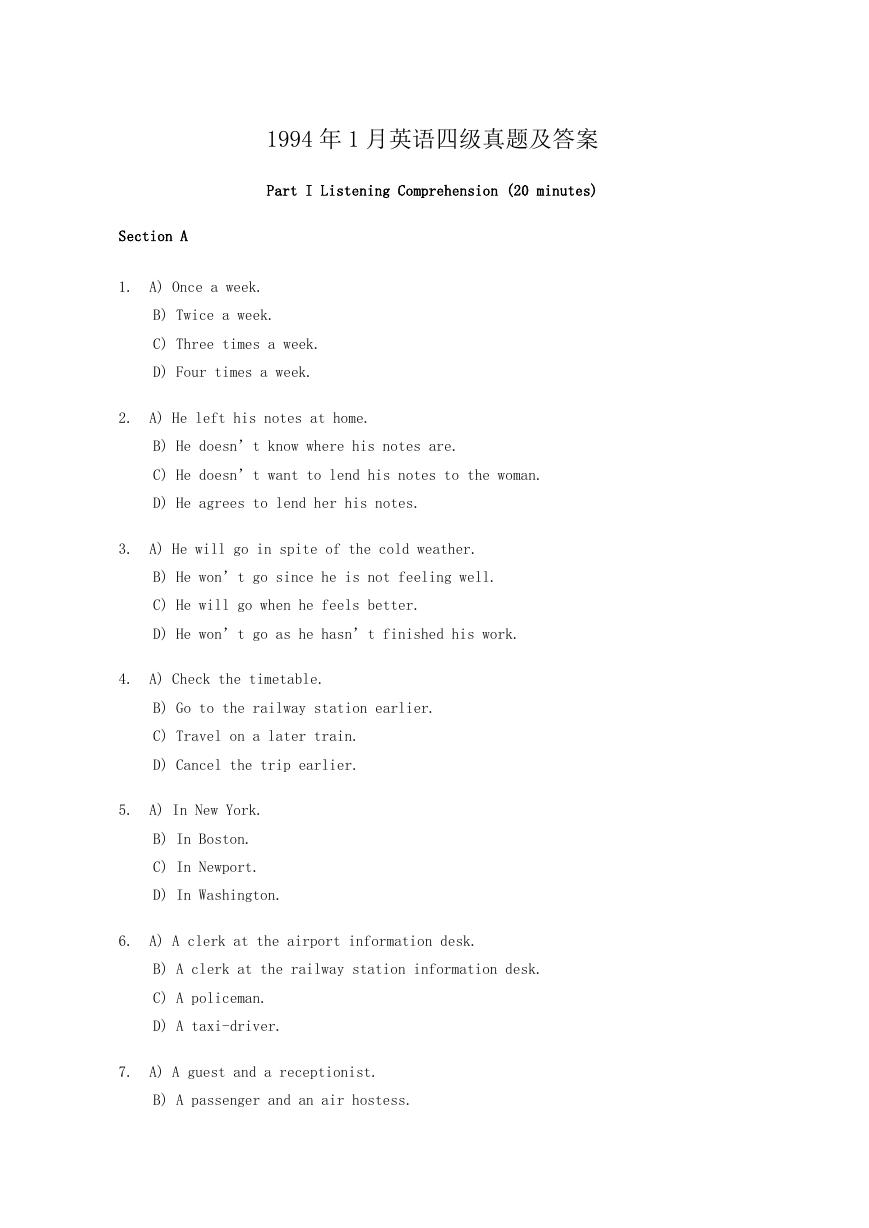
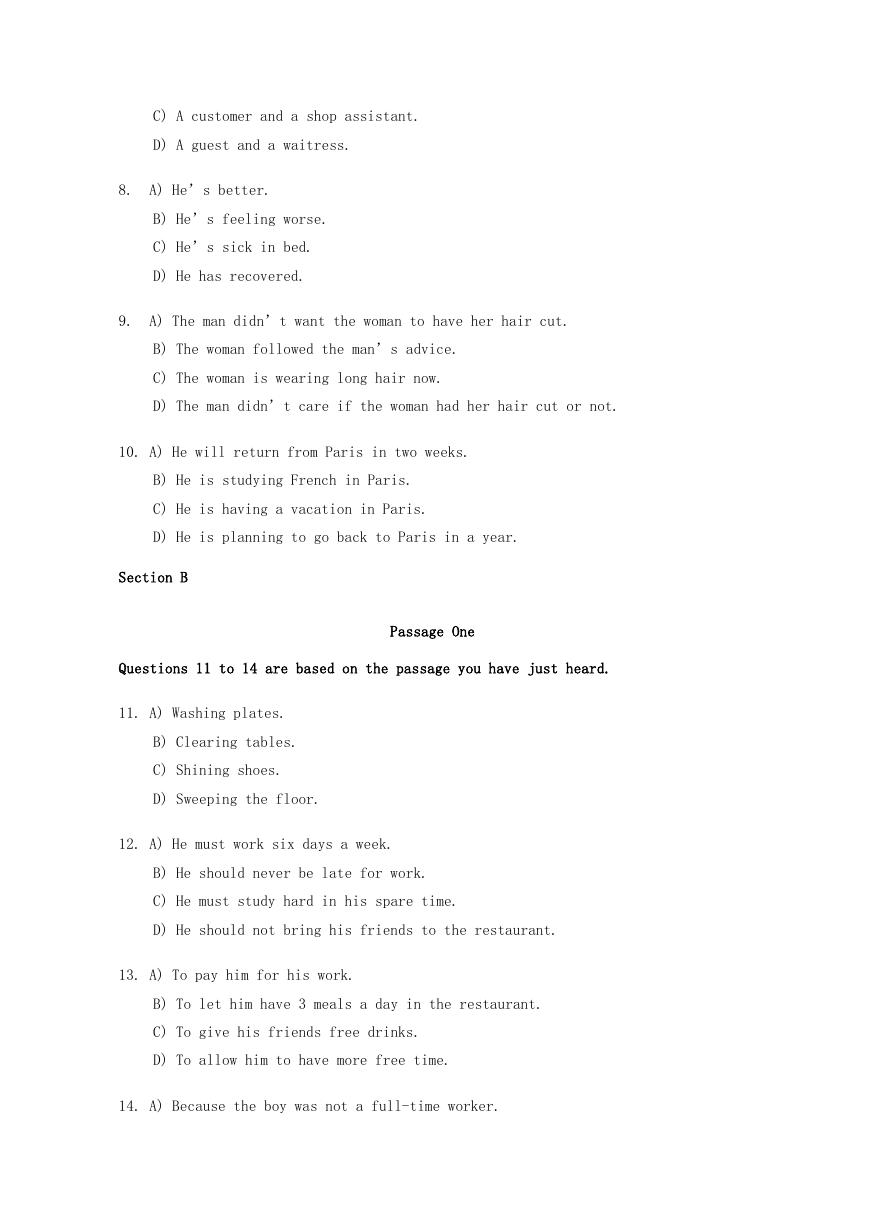
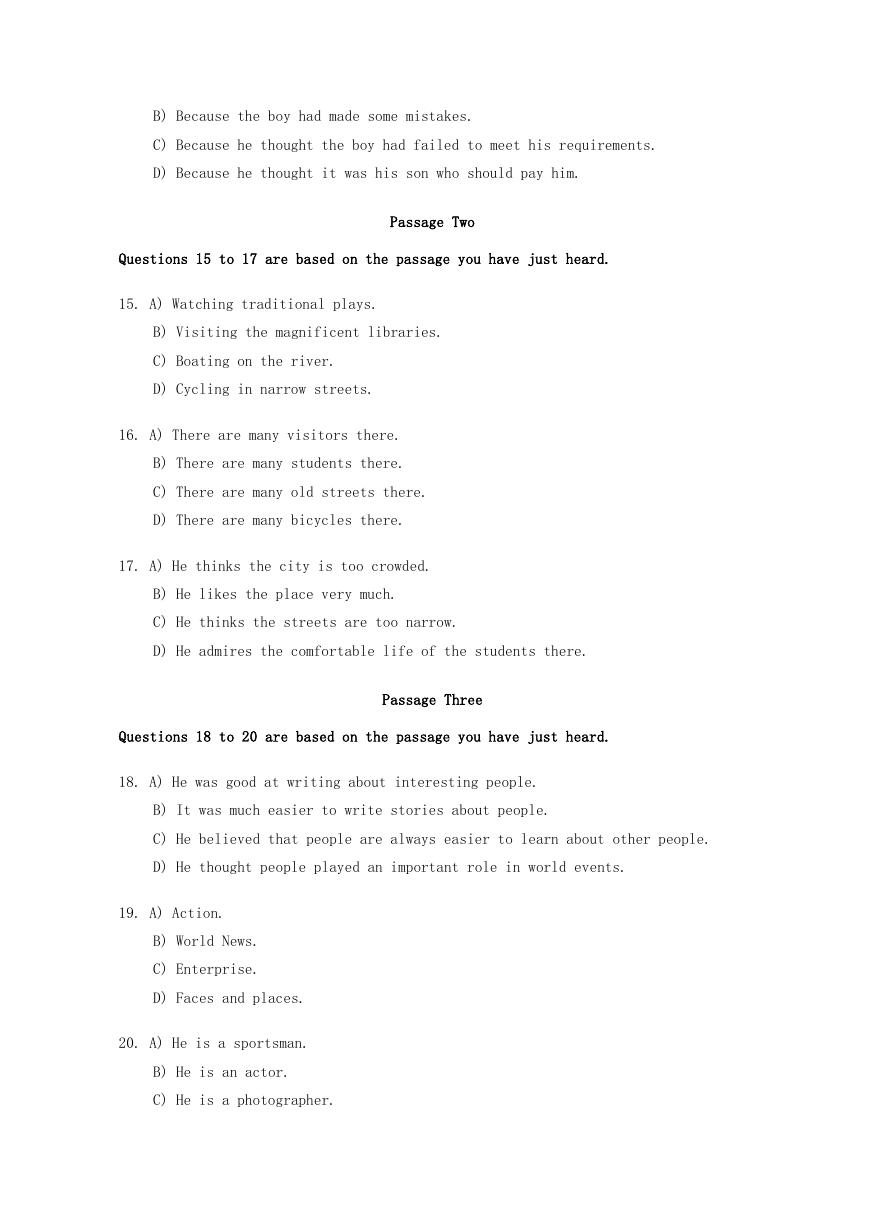
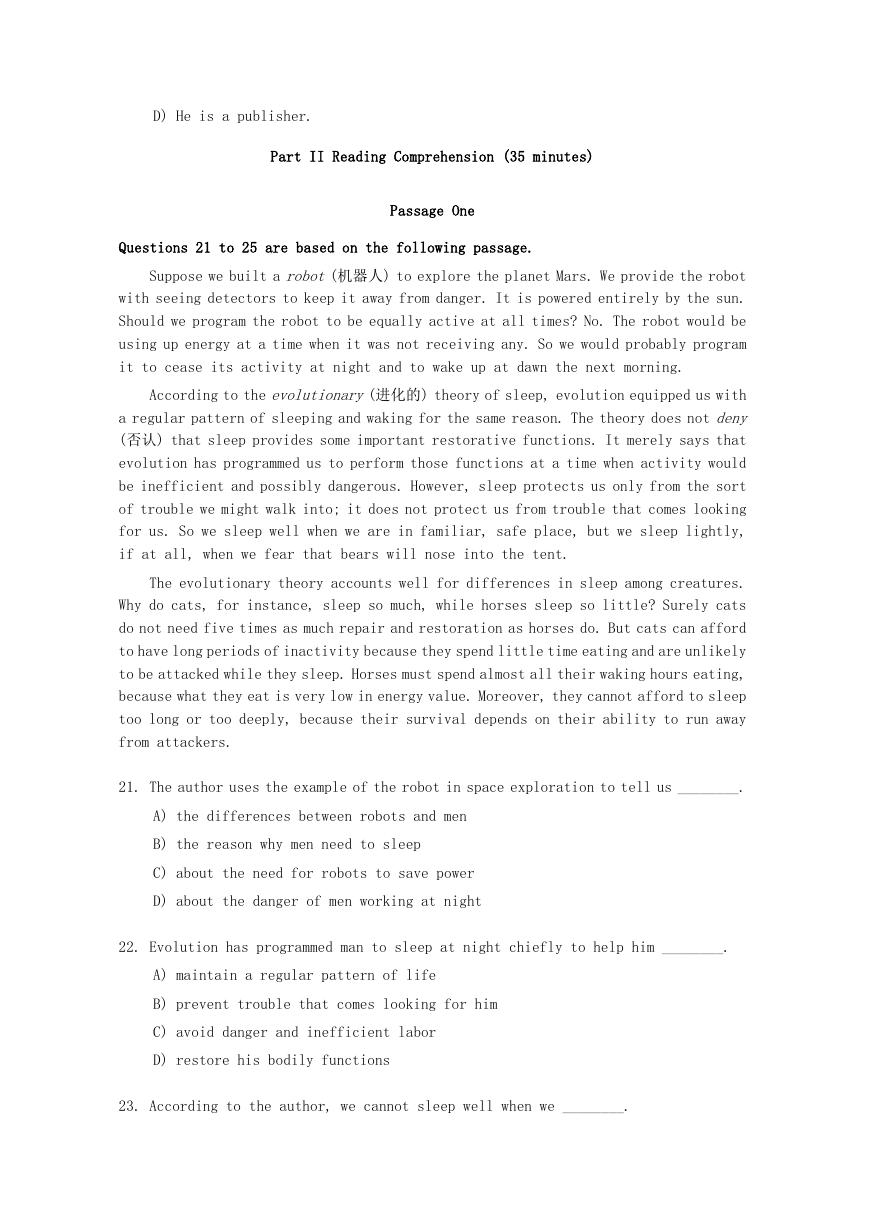
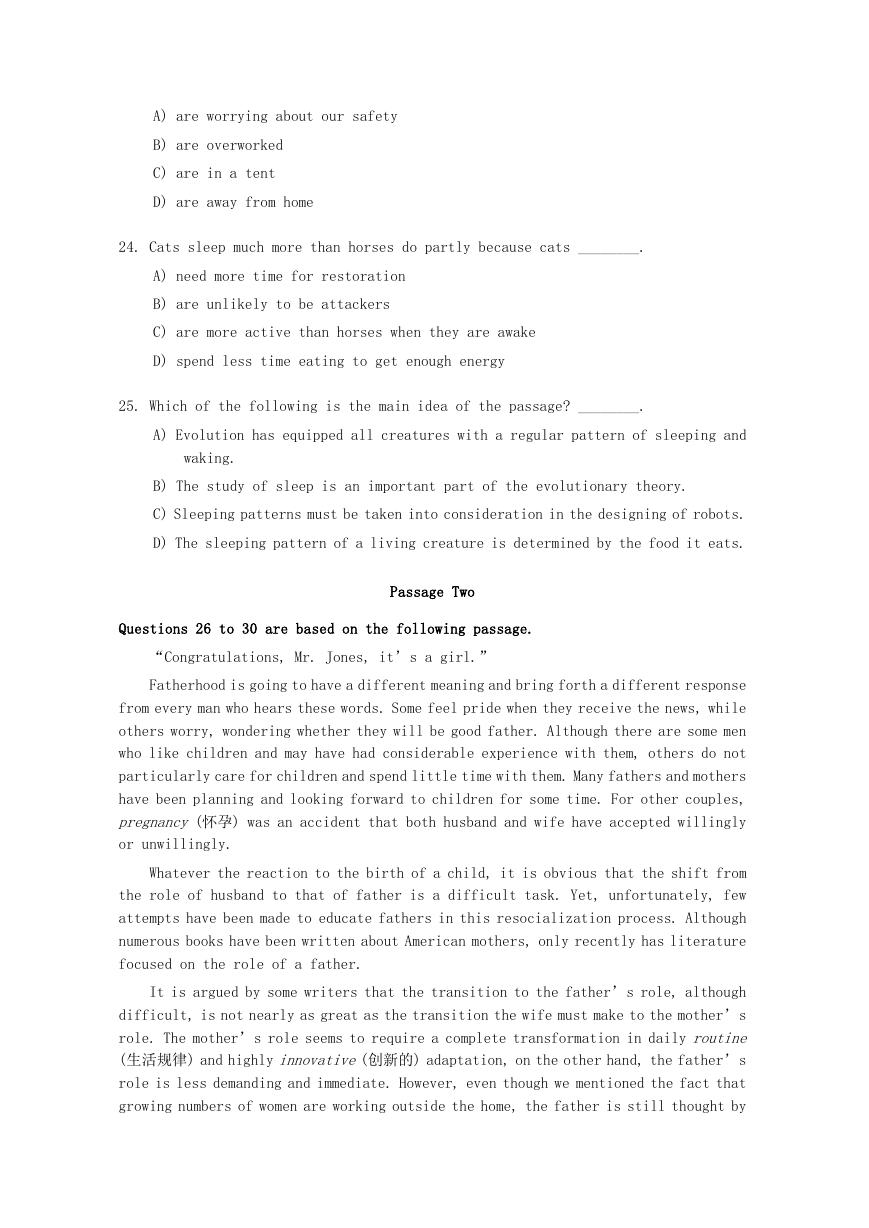
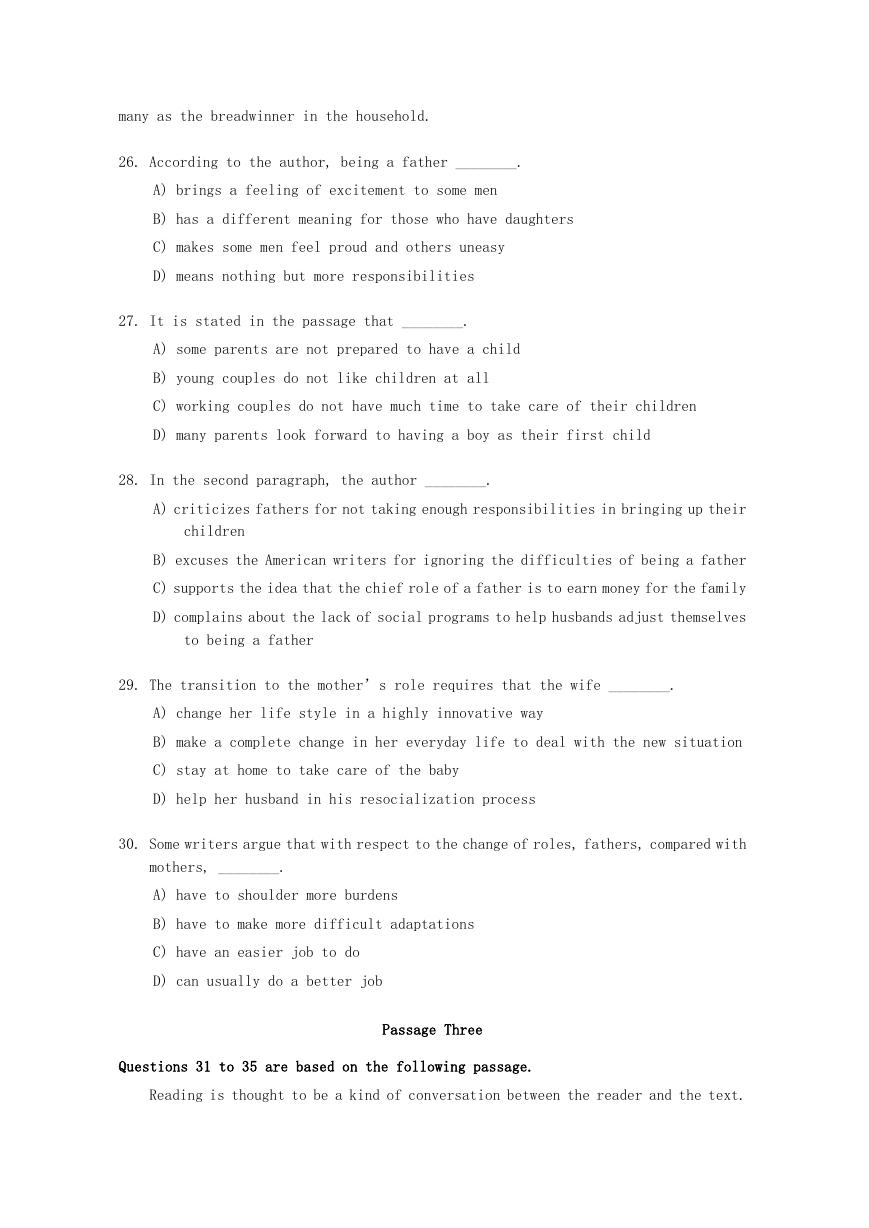
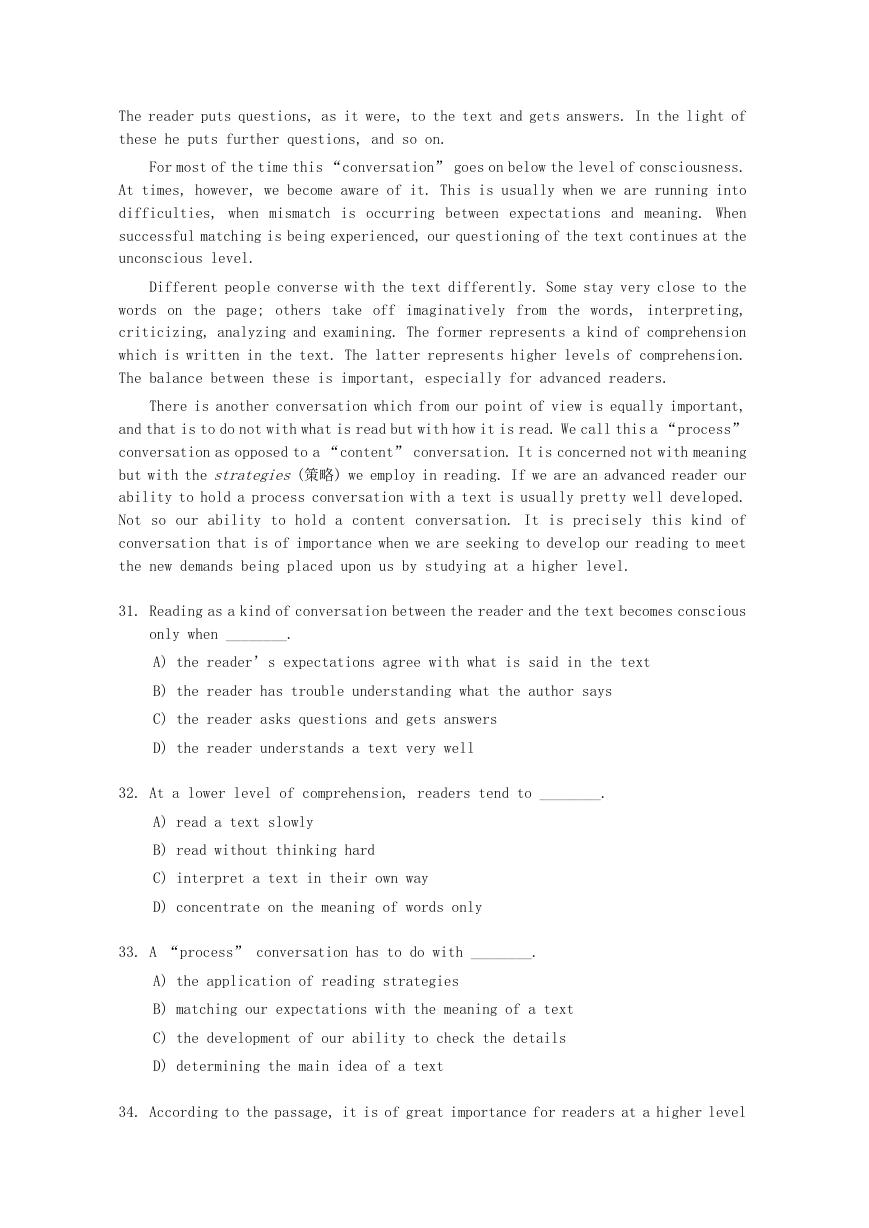
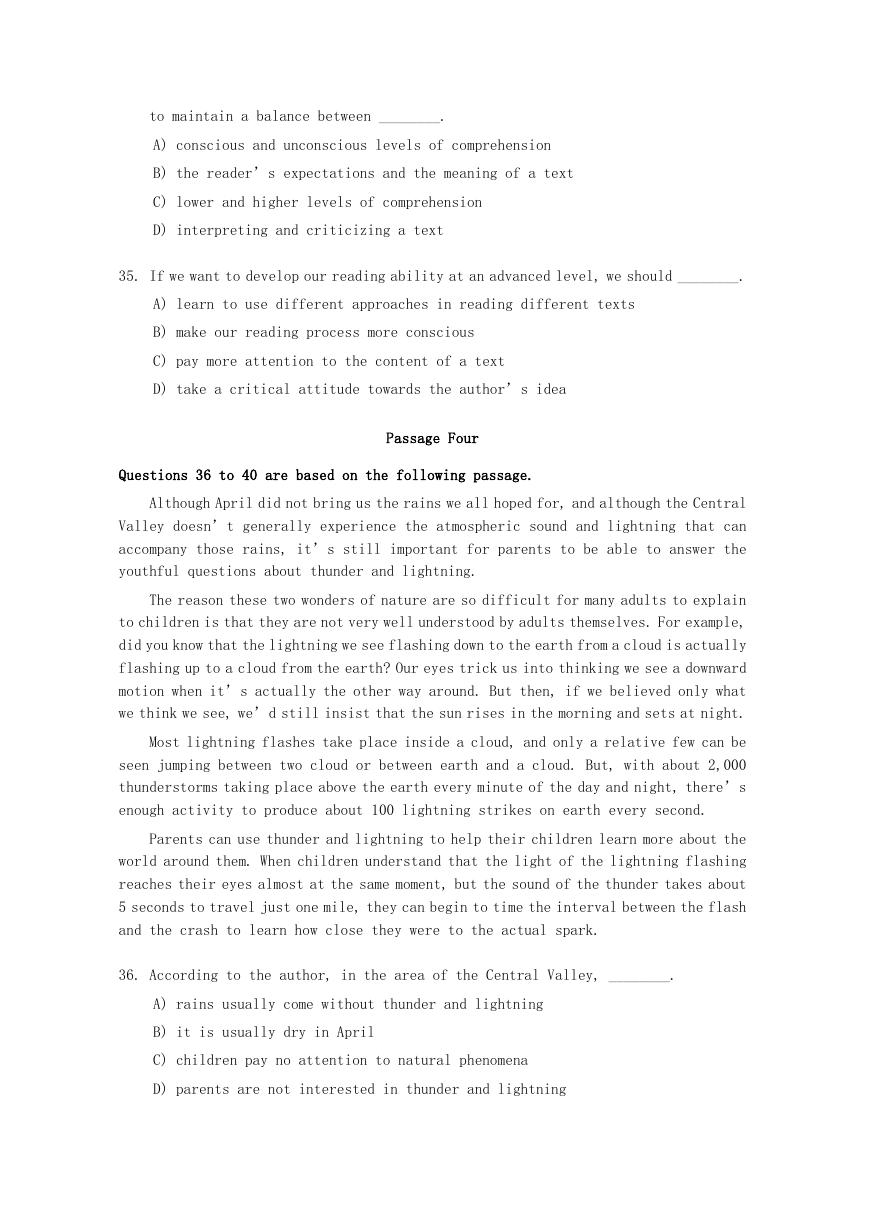








 2023年江西萍乡中考道德与法治真题及答案.doc
2023年江西萍乡中考道德与法治真题及答案.doc 2012年重庆南川中考生物真题及答案.doc
2012年重庆南川中考生物真题及答案.doc 2013年江西师范大学地理学综合及文艺理论基础考研真题.doc
2013年江西师范大学地理学综合及文艺理论基础考研真题.doc 2020年四川甘孜小升初语文真题及答案I卷.doc
2020年四川甘孜小升初语文真题及答案I卷.doc 2020年注册岩土工程师专业基础考试真题及答案.doc
2020年注册岩土工程师专业基础考试真题及答案.doc 2023-2024学年福建省厦门市九年级上学期数学月考试题及答案.doc
2023-2024学年福建省厦门市九年级上学期数学月考试题及答案.doc 2021-2022学年辽宁省沈阳市大东区九年级上学期语文期末试题及答案.doc
2021-2022学年辽宁省沈阳市大东区九年级上学期语文期末试题及答案.doc 2022-2023学年北京东城区初三第一学期物理期末试卷及答案.doc
2022-2023学年北京东城区初三第一学期物理期末试卷及答案.doc 2018上半年江西教师资格初中地理学科知识与教学能力真题及答案.doc
2018上半年江西教师资格初中地理学科知识与教学能力真题及答案.doc 2012年河北国家公务员申论考试真题及答案-省级.doc
2012年河北国家公务员申论考试真题及答案-省级.doc 2020-2021学年江苏省扬州市江都区邵樊片九年级上学期数学第一次质量检测试题及答案.doc
2020-2021学年江苏省扬州市江都区邵樊片九年级上学期数学第一次质量检测试题及答案.doc 2022下半年黑龙江教师资格证中学综合素质真题及答案.doc
2022下半年黑龙江教师资格证中学综合素质真题及答案.doc